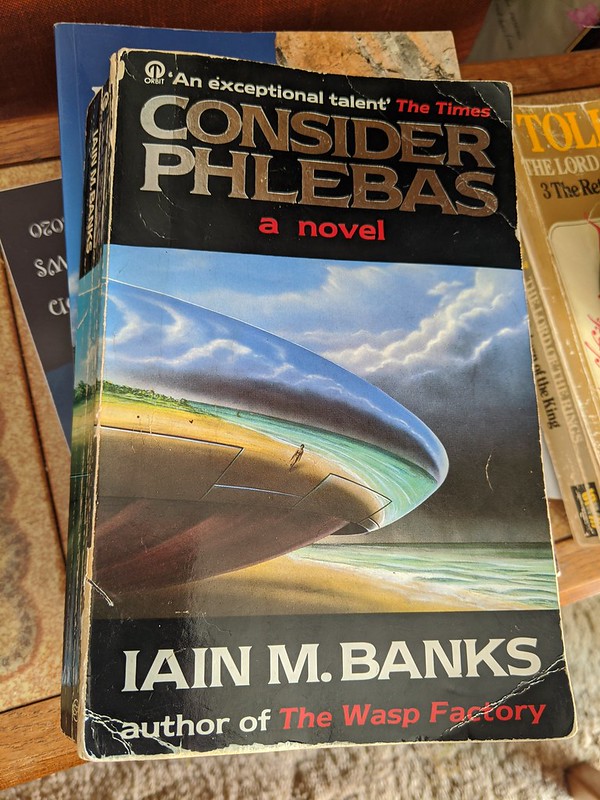 There's also: Look to Windward.
There's also: Look to Windward.Consider Phlebas was the first Banks I read I think, many years ago; my copy looks to have been second hand. It features a mirror-spaceship on a beach being approached by a probably-naked humanoid, with a threatening storm in the background. It's a good cover, far better than the rather trashy one that wiki features. I may have read The Wasp Factory before this. The book was generally very well received as a fast-paced space opera with a morally ambiguous hero and much grand scenery and devices is about right. In some ways it is a series of glorious set-pieces linked by narrative, but that isn't too obvious as you read it, and the narrative is good, so it all works. My favourite is the fight under the hovercraft. This is either the second or third time (in rather a long time) that I've read it. If you look at the pic you can guess I've just re-read Lord of the Rings (again). LOTR is definitely the better book, and one I've read more often.
Banks does get some things right, in contrast to many more thoughtless scifi authors. The Wiki prose says The Culture and the Idiran Empire are at war in a galaxy-spanning conflict but this isn't true: as the "epilogue" says, at most the war covered 0.02% of the galaxy by volume and 0.01% by population. Some rather less plausible things - like Horza being picked up by the CAT - are sort of necessary to the story but just happen quickly and Banks at least doesn't attempt to make them plausible.
The overall motivation for the war, and the various characters in supporting their sides, isn't terribly important - the way the story plays out (despite nominal motivations) it turns into humanoids vs monstrous aliens. But this doesn't matter... perhaps that's part of the reason LOTR is better; people's motivations there always matter, and no-one is morally ambiguous. Horza's support of the Idirans is somewhat weakly justified but not entirely implausible, and serves to throw some light on the Culture. But there's no agonising over the Culture's purpose; that comes in later books.
Most of the book is wham-bamm type stuff; the one rather more disturbing scene is the "eaters" and I find that, errrm, well a little disturbing. Unlike the opening scene of Horza nearly drowning in excrement, which doesn't affect in nearly the same way. Or the bald assertion that 895 billion people die.
Banks does get some things right, in contrast to many more thoughtless scifi authors. The Wiki prose says The Culture and the Idiran Empire are at war in a galaxy-spanning conflict but this isn't true: as the "epilogue" says, at most the war covered 0.02% of the galaxy by volume and 0.01% by population. Some rather less plausible things - like Horza being picked up by the CAT - are sort of necessary to the story but just happen quickly and Banks at least doesn't attempt to make them plausible.
The overall motivation for the war, and the various characters in supporting their sides, isn't terribly important - the way the story plays out (despite nominal motivations) it turns into humanoids vs monstrous aliens. But this doesn't matter... perhaps that's part of the reason LOTR is better; people's motivations there always matter, and no-one is morally ambiguous. Horza's support of the Idirans is somewhat weakly justified but not entirely implausible, and serves to throw some light on the Culture. But there's no agonising over the Culture's purpose; that comes in later books.
Most of the book is wham-bamm type stuff; the one rather more disturbing scene is the "eaters" and I find that, errrm, well a little disturbing. Unlike the opening scene of Horza nearly drowning in excrement, which doesn't affect in nearly the same way. Or the bald assertion that 895 billion people die.
No comments:
Post a Comment